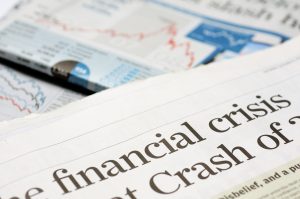Here we go again, building walls of worry.
To be sure, the news makes it pretty easy for us to do. Nothing seems to be hitting on all cylinders, does it? However, this past week took the negativity to a whole new level. If this keeps up, my chestnut brown hair will turn white.
Yesterday, a bank out in California essentially collapsed, Silicon Valley Bank. While many might not be familiar with it, it is a big lender, as in $200+ billion. So, its problems caught investors’ attention. The root cause? Rising interest rates have caused the market value of their bond portfolio to go down.
Due to a variety of factors, arguably the niche nature of its business model, depositors have been taking out a lot of cash. In order to generate the necessarily liquidity, the bank has been selling fixed income securities at a loss. Obviously, this has had a huge negative impact on the bank’s net income and capital. This, then, has caused more people to take their money out.
If it sounds like a “run on the bank” and a death spiral, it sort of is.
 However, is Silicon Valley Bank a canary in the coal mind? It is a precursor of bad things to come? Is another 2008 right around the corner? Is the devil coming to dinner? Inquiring minds want to know.
However, is Silicon Valley Bank a canary in the coal mind? It is a precursor of bad things to come? Is another 2008 right around the corner? Is the devil coming to dinner? Inquiring minds want to know.
At the risk of sounding cavalier, I would argue it isn’t.
As I told people yesterday, the current problem with bank capital is a more of an accounting function than a fundamental weakness. In fact, the powers that be could snap their fingers and create literally hundreds of billions in new capital. Seriously.
You just have to remember a little Accounting 101. On one side of the ledger are assets. For a bank, these are largely loans, physical property and, drum roll please, bonds. On the other side of the page are liabilities. In case you didn’t know, deposits are liabilities for a bank. As you know, the difference between assets and liabilities is equity or capital. So, when the market value of a bank’s bonds goes down, so does bank capital.
While this is a simplistic explanation, it really is just math. But how can the powers that be just create capital out of thin air? That is if it really is just math.
You see, banks can hold their bonds (and other assets) in one of two buckets.
- The first is called ‘Hold to Maturity’ or HTM. As the name implies, the bank holds these assets until they mature, as opposed to selling. In order to compensate for the lack of liquidity, the bank gets to account for these on an “amortized cost” basis instead of a true market value.
- The other basket known as “Available for Sale” or AFS. The bank uses the securities in this bucket for general liquidity or to try and time the market. In essence, they are trading assets. Since they are such, the company has to put a true market value on them for accounting purposes. Ergo the phrase “marked to market.”
Assuming there isn’t a system wide run on cash, Federal (and state) regulators could simply allow banks to shift their government-backed bonds from their AFS bucket to HTM AND reprice them back to the amortized cost. This change in accounting practices would result in potentially much higher valuations.
So, what happens when assets go UP while liabilities stay the same? That’s right. Equity, or capital, goes up by definition.
But they can’t just do that, can they? I mean, changing the rules in the middle of the game? That’s just dishonest, and wouldn’t be fitting. After all, banks get to choose which bucket they use for securities. As such, they should have to pay the price, one way or the other. Other companies don’t get to just reprice the asset side of their balance sheet out of thin air.
Two things about that.
First, I can’t argue with the last paragraph. It does seem a bit underhanded and shady. Second, the Feds can pretty much do what it wants in this regard. Haven’t we seen them twist the rules enough over the years? Throw bankruptcy laws out the window? Engineered dubious bank mergers? Created money out of thin air? If you responded with anything other than yes, I would rethink your answer.
Then, there is the crux of the matter. If the entire financial system was on the verge of collapse due to the marked to market value of its bond portfolio, would you still complain as much? Understanding the FDIC has nowhere near the necessary money to insure every single dollar of ‘insured” deposits, let alone all of the uninsured.
Yeah, I imagine most of us would turn a blind eye or two.
Compare this to the 2007-2008 Financial Crisis.
 What was the problem then? Was it simply how banks account for their securities portfolio? Or was it due to the fact borrowers didn’t pay back their loans, en masse? That the secondary, or tertiary as the case may be, market for mortgages collapsed? That corporate credit spreads mushroomed as the demand for debt evaporated? That liquidity in the financial system essentially vanished?
What was the problem then? Was it simply how banks account for their securities portfolio? Or was it due to the fact borrowers didn’t pay back their loans, en masse? That the secondary, or tertiary as the case may be, market for mortgages collapsed? That corporate credit spreads mushroomed as the demand for debt evaporated? That liquidity in the financial system essentially vanished?
As I type, none of that is currently present. That isn’t to say it never could or will, it just isn’t. But, since I opened that can of worms… will it?
There are only 3 sure things in life: death, taxes and a sale at JoS.A.Bank.
So, I usually refrain from using the word never. However, I think a return to a 2008 death knell scenario is highly unlikely at this time. The banking system is NOT overextended the way was back then. While loan losses will increase some over the next several years thanks to these higher rates, there is a lot of equity in the banking system in absolute terms.
Finally, as I have argued in this newsletter, the Feds can create fresh capital by simply allowing banks to shift assets from AFS to HTM and reprice them accordingly without penalty. Voila. Financial crisis averted.
In the end, if I have done nothing else this week, I hope I have removed at least one brick from your wall of worry. The Silicon Valley Bank imbroglio isn’t a sign of things to come, or shouldn’t be. If it is, it is because Washington is asleep at the wheel.
Oops…I might have just put that brick back in the worry wall.
Thank you for your continued support. As always, I hope this newsletter finds you and your family well. May your blessings outweigh your sorrows on this any every day. Also, please be sure to tune into our podcast, Trading Perspectives, which is available on every platform.

John Norris
Chief Economist & Brick Mason
Please note, nothing in this newsletter should be considered or otherwise construed as an offer to buy or sell investment services or securities of any type. Any individual action you might take from reading this newsletter is at your own risk. My opinion, as those of our Investment Committee, is subject to change without notice. Finally, the opinions expressed herein are not necessarily those of the rest of the associates and/or shareholders of Oakworth Capital Bank or the official position of the company itself.



